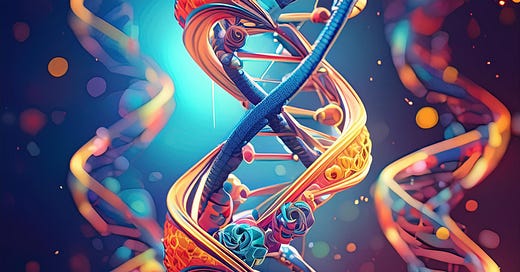Understanding Genetic Expression: Your Genes Are Not Your Destiny
TLDR - Your environment, lifestyle, and even your thoughts and emotions play a crucial role in determining how your genes express themselves. Rather than being bound by genetic predisposition, you have the ability to influence your health outcomes through daily choices.
What is Gene Expression?
Gene expression is the process by which genetic information is converted into functional proteins that perform essential roles in the body. While DNA provides the blueprint, gene expression determines how, when, and to what extent these instructions are carried out. In essence, DNA is the instruction manual, while gene expression is the process of reading and executing those instructions.
How Gene Expression Differs from DNA
DNA: The stable, long-term storage of genetic information that remains mostly unchanged throughout life.
Gene Expression: A dynamic process influenced by internal and external factors, allowing the same DNA to produce different biological responses depending on the conditions.
The Role of Epigenetics: Why Environment Matters
Epigenetics refers to the mechanisms that regulate gene expression without altering the DNA sequence itself. These modifications are influenced by environmental factors, including:
Diet
Exposure to toxins
Stress levels
Physical activity
Light exposure
Emotional and mental states
Contrary to common belief, genes do not determine your fate. Approximately 98% of diseases are influenced by epigenetic factors, meaning that your environment determines whether those genes are activated or suppressed. Only about 2% of diseases are caused by genetic mutations that cannot be modified by environmental changes.
For instance:
A person with a genetic predisposition for metabolic disorders may never develop one if they maintain a nutrient-dense diet, get sufficient sunlight, and manage stress effectively.
On the other hand, a person with the same genetic predisposition but exposed to chronic stress, poor diet, and environmental toxins may develop insulin resistance, obesity, or other metabolic conditions.
When Genes Are the True Cause of Disease
While most health conditions are influenced by epigenetics, there are certain conditions that are directly caused by genetic mutations and cannot be altered by lifestyle changes. Examples include:
Cystic Fibrosis – A hereditary disease caused by mutations in the CFTR gene, leading to thick mucus buildup in the lungs and digestive system.
Sickle Cell Anemia – A genetic condition affecting red blood cells, caused by mutations in the HBB gene.
Huntington’s Disease – A progressive neurodegenerative disorder caused by a single gene mutation in the HTT gene.
Tay-Sachs Disease – A fatal genetic disorder that affects the nervous system, caused by mutations in the HEXA gene.
For these conditions, epigenetic modifications cannot reverse or prevent the disease. However, lifestyle and environmental factors may still help manage symptoms and improve quality of life.
Environmental Impact on Gene Expression
Gene expression changes in response to environmental conditions, influencing physiological processes and even lab markers used by medical providers. Here are some key environmental factors that impact gene expression:
Sunlight Exposure
Vitamin D Synthesis: Increased sunlight exposure boosts vitamin D production, regulating genes involved in immune function, bone health, and mood.
Circadian Rhythms: Sunlight regulates the body's internal clock, influencing genes that control sleep cycles, hormone release, and metabolism.
Temperature Changes
Thermogenesis: In colder months, the body increases heat production by activating genes related to fat metabolism and energy expenditure.
Metabolic Adjustments: Seasonal temperature shifts can alter genes responsible for fat storage and energy use.
Diet & Nutrient Availability
Nutrient Intake: Seasonal diets affect genes linked to detoxification, metabolism, and cellular repair.
Caloric Intake: Variations in caloric consumption influence genes governing energy balance and fat storage.
Immune Function & Pathogen Exposure
Seasonal Infections: Winter months bring increased respiratory infections, activating immune-related genes.
Inflammatory Responses: Reduced physical activity and colder temperatures can upregulate inflammatory pathways, impacting immune function.
Hormonal Fluctuations
Melatonin Production: Longer nights increase melatonin levels, influencing genes associated with sleep, oxidative stress, and immune support.
Cortisol Levels: Stress and lifestyle shifts affect genes governing stress response and metabolism.
The Power of Your Mindset & Emotional State
Your thoughts and emotions are another major influence on gene expression. Chronic stress, negative emotions, and a pessimistic outlook can activate genes related to inflammation and disease progression, while positive emotions, gratitude, and joy can promote genes that enhance immune function and reduce stress-related damage.
Examples:
Chronic Stress: Upregulates genes associated with inflammation and immune suppression.
Positive Emotions: Activate genes that support immune resilience and lower inflammation.
Recap: Your Genes Are Not Your Destiny
Your genes do not dictate your health—your environment does in most cases. Gene expression has a greater impact on biological processes than genetic predisposition, meaning you have control over how your genes function.
Key Takeaways:
98% of diseases are influenced by epigenetics and lifestyle, while only 2% are directly caused by genetics.
Genetics provide a blueprint, but your lifestyle determines the final outcome.
Epigenetics explains how your choices shape gene expression.
Optimizing environment, nutrition, and mindset leads to better health outcomes.



